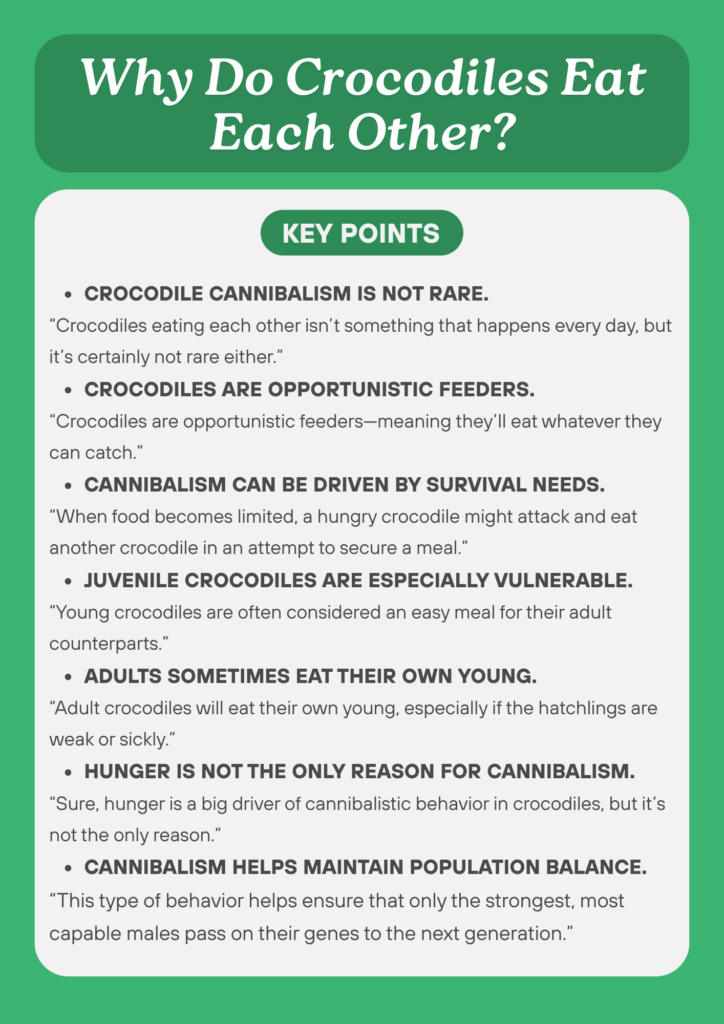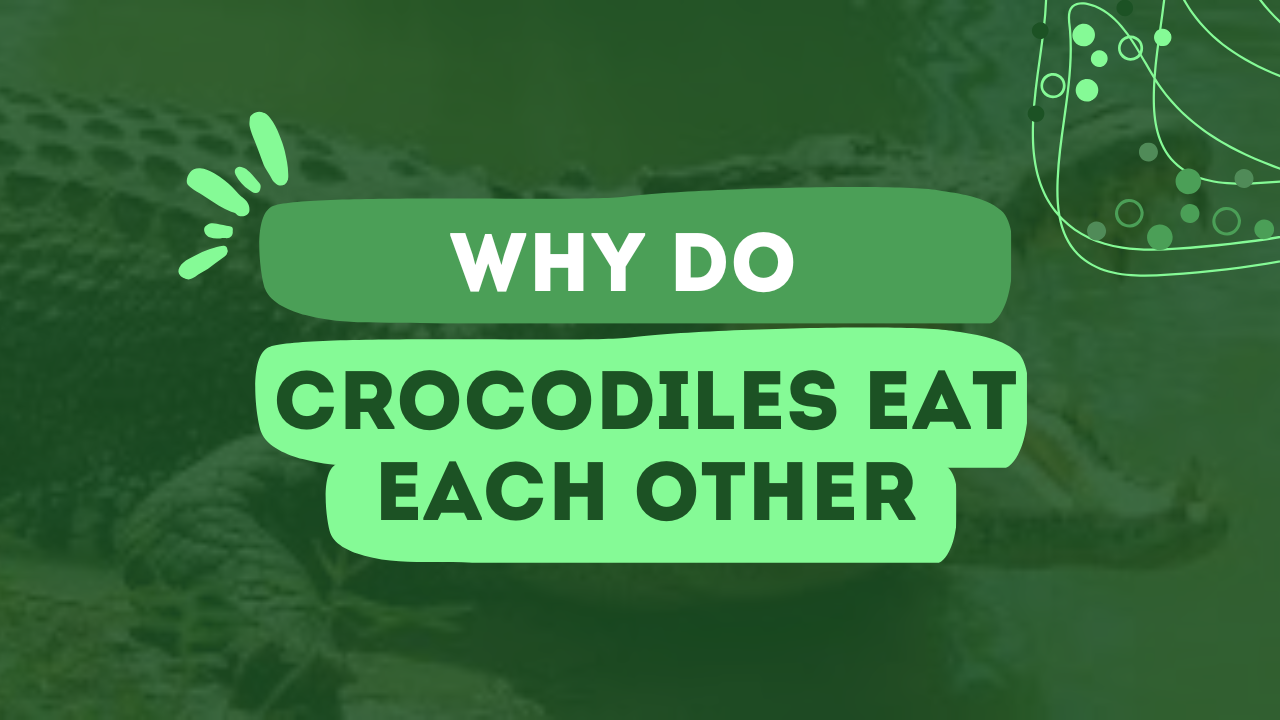When we think of crocodiles, we tend to imagine large, fearsome predators lurking in murky waters, waiting to snap up an unsuspecting animal that wanders too close. But did you know that these reptiles, known for their ferocious nature, sometimes turn their jaws on each other? Yep, crocodiles do indeed eat each other—and it’s not as rare as you might think. While it might sound like something straight out of a nature documentary, the reasons behind this cannibalistic behavior are pretty interesting. From survival instincts to territory disputes, there’s a lot more to it than just the usual “eat or be eaten” mentality. In this article, we’ll dive into the why and how of crocodile cannibalism and explore some surprising facts about their eating habits. Let’s get into it!
Crocodile Cannibalism: Is It Really That Common?
First things first, let’s address the elephant in the room. Crocodiles eating each other isn’t something that happens every day, but it’s certainly not rare either. In fact, many species of crocodiles have been observed engaging in this type of behavior, both in the wild and captivity. The behavior might be shocking at first, but when you look closely, it all makes sense. Crocodiles are opportunistic feeders—meaning they’ll eat whatever they can catch. And if that includes one of their own kind, so be it.
While it may seem like something you’d expect from a desperate or starving crocodile, cannibalism can actually be a strategic move, a part of their survival tactics. There are several key reasons why crocodiles might resort to eating each other, and some of them might surprise you.
Survival of the Fittest
Crocodiles are territorial creatures, and their territory means everything to them. These massive reptiles are known to be fiercely protective of their homes, often going to great lengths to defend them from intruders. But what happens when food is scarce, and the population of crocodiles in a particular area is large? Well, in such cases, competition for resources can become extremely fierce.
When food becomes limited, a hungry crocodile might attack and eat another crocodile in an attempt to secure a meal. This isn’t just about hunger—this is about survival. It’s also important to note that juvenile crocodiles, when they’re still small, are especially vulnerable to being eaten by larger, more dominant crocodiles. In fact, young crocodiles are often considered an easy meal for their adult counterparts.

Territory and Hierarchy
Speaking of territory, crocodiles are known to establish dominance within their home range. Larger and more aggressive individuals typically assert control over a specific area, and any crocodile that dares to intrude may face a brutal attack—or worse, end up as dinner. This behavior is part of a natural social hierarchy that determines which crocodile gets access to the best hunting grounds and most favorable conditions.
Now, this isn’t to say that every crocodile will cannibalize another for territory. It’s more likely to happen when there is a shortage of space or resources, especially during dry seasons when the water levels are low and food is harder to come by. In some cases, the intruder will be driven off or killed by the dominant crocodile, sometimes resulting in cannibalism as the aggressive croc takes advantage of the situation.
Mating Rituals and Rivalry
Believe it or not, cannibalism can also play a role in mating behavior. Male crocodiles are particularly territorial when it comes to courting females, and they often engage in intense battles to win the right to mate. These fights can get bloody and vicious. In some rare cases, a defeated male might be killed and eaten by the winner. This type of behavior helps ensure that only the strongest, most capable males pass on their genes to the next generation.
During the mating season, males become more aggressive, fighting for access to females and fighting off other males who might be encroaching on their territory. While most of these territorial disputes result in injury rather than death, it’s not entirely uncommon for the loser to be cannibalized by the victor. This is nature’s way of ensuring that the fittest survive to reproduce.
Protecting Their Young (and Sometimes Eating Them)
Crocodiles are fiercely protective parents, particularly when it comes to their eggs and young hatchlings. However, this protectiveness can sometimes take a dark turn. In some instances, adult crocodiles will eat their own young, especially if the hatchlings are weak or sickly. This may seem like a horrible act of betrayal, but it’s actually a natural instinct aimed at preventing the spread of disease or ensuring that only the healthiest young survive.
In some cases, particularly when food is scarce, crocodiles may view their young as a potential food source. This might sound heartless, but it’s a brutal fact of nature. Parents, in a sense, can make the harsh decision to eat their offspring to improve their chances of survival. While this doesn’t happen frequently, it has been observed in several species of crocodiles, particularly in situations where food is in short supply.
Why It’s Not Just About Hunger
You might be thinking, “Okay, but if food is abundant, why would crocodiles eat each other?” That’s a fair question, and the answer isn’t always as straightforward as you might expect. Sure, hunger is a big driver of cannibalistic behavior in crocodiles, but it’s not the only reason. Sometimes, it’s just a matter of opportunity. Crocodiles are opportunistic feeders, meaning they’ll take advantage of any chance they get to make a meal out of whatever’s available, even if that means eating another crocodile.
This is especially true for young crocodiles. As mentioned earlier, juveniles are highly vulnerable to being eaten by larger, more dominant crocs, and they’re often targeted because they are an easy meal. Additionally, some crocodiles might eat another simply because they’re weaker or injured, making them an easier target. It’s all part of the harsh survival game they play.
Conclusion: Cannibalism in the Crocodile World
So, there you have it. Crocodiles eat each other for a variety of reasons, from survival instincts and territorial battles to sometimes even cannibalism as a strategy during mating season. While the idea of one crocodile munching on another may sound strange, it’s actually a natural part of their behavior and a reflection of their brutal world. Whether it’s competition for territory, the need to secure food, or simply taking advantage of an opportunity, crocodile cannibalism is just one more reminder of the wild—and often unforgiving—nature of these ancient reptiles.
And while it may seem shocking to us, it’s all part of the circle of life for these fascinating creatures. So next time you find yourself watching a crocodile lazing in the sun or swimming gracefully through the water, remember that they’re not just cold-blooded—they can be downright cannibalistic when the need arises!

